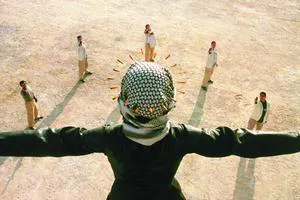Divine Intervention: A Hilarious and Heartbreaking Look at the Israeli-Palestinian Conflict
Anyone who dismisses “Divine Intervention” as a political and anti-Semitic film is missing out. This movie is, first and foremost, incredibly funny, touching, and lighthearted. Secondly, it’s a deeply personal work by Elia Suleiman, who wrote, directed, and starred in it. While he happens to be Palestinian by birth, that’s as much a part of his identity as being Jewish is for someone like Igor Guberman.
You can passionately hate anti-Semites and love genuine artists. The merit of filmmakers like Suleiman lies in their ability to dissect complex issues, like the Israeli-Palestinian conflict, with simplicity and clarity. They prioritize the human element, which remains consistent regardless of the murky waters stirred by politicians and criminals. In this context, the title “Divine Intervention” is a self-deprecating joke by Suleiman. The Arab-Israeli conflict seems endless, and those who witnessed its beginnings are long gone. Each new incident is triggered by yet another unsavory character, who could just as easily be a cyclist as a Jew. Only the latest human death can put an end to the cycle of terror and counter-terrorism, revealing the absurdity of the situation and diagnosing the “states” involved, all of whom deserve a tag on their toe.

Suleiman’s father was killed by Israelis, but he didn’t become embittered, which distinguishes him as an artist rather than a revolutionary. The film presents a different, somewhat mocking story about the protagonist’s father. The movie itself is cleverly constructed. The main character doesn’t appear at the beginning and is framed by two relationships. The film initially focuses on an uncle-like welder, living a mundane life until a heart attack reveals him as Suleiman’s unfortunate father. Towards the end, the film shifts to a fantastical portrayal of a “Palestinian woman” – a fearless terrorist and the protagonist’s beloved – which is as heartbreaking as it is unrealistic. The stark contrast between these relationships (the inability to abandon his father in Jerusalem and his lover in Ramallah) allows Suleiman to weave in various aspects of contemporary life in Nazareth. The film’s subtitle, “A Chronicle of Love and Pain,” becomes synonymous with the well-known concept of “tragic fun.”

It’s reminiscent of Soviet-era slogans: “The pioneers march: ‘Glory to Kibalchish!’” Similarly, in “Divine Intervention,” a Palestinian woman walks by, and an Israeli border post collapses; a Palestinian man drives by, and an Israeli tank explodes. The scenes with the balloon bearing Arafat’s smiling face and the Israeli special forces’ “Matrix: Reloaded”-style training exercises are instantly iconic. It’s a portrayal of “how our side wins.” But the everyday details – the father’s greetings, the idiot at his workplace with the number “six,” the men smoking in the hospital – are universally funny, depicting “how our side goes crazy.” The film also features a unique kind of eroticism: two people sitting in a car, holding hands in silence. The simple act of holding hands for a long time eliminates the need for explicit sex scenes, showing “how our side loves.”

Suleiman incorporates everything he knows from various styles and genres. When a simple story of separation from loved ones – a dying father and a fighting lover – unfolds in a long-standing global hotspot, this blend of styles and genres becomes a profound understanding of life. Suleiman’s inherent Eastern slowness and detachment, which no amount of terror can erase, result in a new style of understanding life: Palestinian. The only drawback of “Divine Intervention” is our limited knowledge of local customs and rituals. Some minor episodes are unclear, and the reactions are lost on us.

The silence and the notes remain enigmatic. Is the protagonist deaf and mute? And what is being cooked in the pressure cooker at the very end?